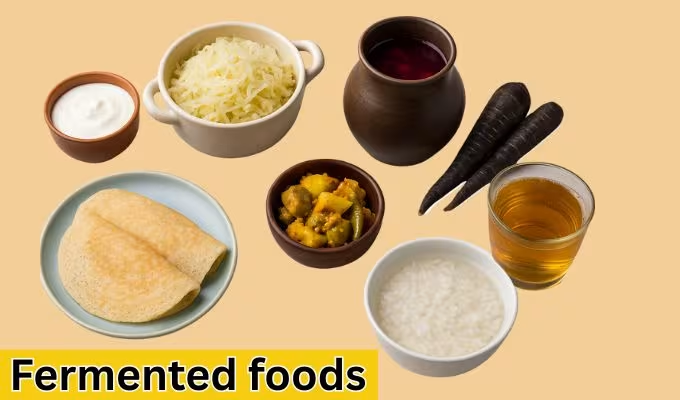Gut Friendly Fermented Foods
Good Health Begins with Good Digestion: Good health is strongly connected to one thing: good digestion—or a good gut.
Your gut is basically your second brain. It helps absorb nutrients, balance hormones, and even boost immunity.
When it’s happy, your skin glows, your mind feels happier, and your whole body just works better.
Your digestive system affects your skin, your mood, and even your energy levels.
Research also shows that fermented foods are more easily digestible by the body.
These foods are enriched with certain vitamins and antioxidants, and they help reduce cholesterol.
Why Fermented Foods Matter
The best way to naturally support your gut is through fermented food.
Fermented foods are food items that have gone through a natural fermentation process, producing probiotics—the good bacteria your gut loves.
Today, I will share a few fermented foods that are easy to add to your diet and are seriously good for your digestion.
1. Homemade Curd (Dahi)
Homemade curd or dahi is one of the most accessible probiotic foods in the Indian kitchen.
It contains live culture that supports gut flora.
Just a small bowl during lunch can help balance digestion and reduce bloating.
2. Sauerkraut
Sauerkraut might sound fancy, but it’s simply fermented cabbage with a tangy taste.
It’s packed with fiber, vitamin C, and natural probiotics.
All it needs is cabbage, salt, and time—no vinegar.
You can top it on toast, grain bowls, or have a spoon on the side with beans.
3. Kanji – A Traditional Fermented Drink
Kanji is a traditional fermented drink made with black carrot, mustard seeds, and salt. It’s tangy, slightly spicy, and excellent for digestion.
To make Kanji:
- 3 medium carrots
- 4 cups filtered water
- 1 teaspoon mustard seeds
- 1 teaspoon salt
Method: Peel and cut the carrots. In a large glass jar or bottle, add the water, crushed mustard seeds, salt, and chili powder.
Stir well, then add the carrot pieces. Cover the jar with muslin cloth or a loose lid.
Place it in sunlight for 2-3 days for fermentation.
Stir once daily with a clean spoon.
Once it’s slightly tangy and fizzy, it’s ready—a probiotic potion, good to go.
4. Idli and Dosa Batter
Idli and dosa may seem like simple breakfast staples, but their batter is a powerful fermented food that supports digestion and gut balance.
The batter is made by soaking and grinding rice and urad dal, then left to ferment overnight (or longer in colder weather).
The natural bacteria break down the mixture, creating lactic acid and encouraging probiotic growth.
It also predigests starches and protein, making it easier on the stomach.
When eaten fresh, without excess oil, ghee, or preservatives, idlis and dosas are light and easy to digest.
5. Fermented Pickles (Achars)
We are not talking about vinegar-heavy pickles stored for years.
Traditional Indian pickles made with mustard oil, salt, and spices are often naturally fermented in the sun.
Mango, lemon, and similar ingredients are packed with probiotic punch.
Just remember to keep portions small—they can be intense on the stomach.
6. Kombucha – The Fizzy Fermented Tea
Kombucha is a unique, fizzy tea that has become popular in health and wellness circles.
It’s made from black or green tea and is slightly sour or sweet.
It is full of probiotics and antioxidants. You can even make it at home if you’re into DIY health drinks.
7. Fermented Rice
This practice is more common in Tamil Nadu and Kerala.
Leftover rice is soaked overnight and eaten the next morning, sometimes with buttermilk.
It creates a cooling probiotic richness that’s excellent for digestion, especially in summer.
Final Words
So the seven fermented foods for the gut are:
| Homemade curd | Sauerkraut |
| Kanji | Idli dosa batter |
| Traditional pickles | Kombucha |
| Fermented rice |
When you feed your gut with the right bacteria, everything else follows—clear skin, better mood, strong immunity, and more energy.
And the best part? These aren’t exotic or hard-to-find ingredients.
Most come straight from your kitchen, your region, or your roots.
So go ahead—add a little fermented touch to your meals, and let your body thank you.
FAQ on Fermented Foods
Q1. Why are fermented foods good for digestion?
Ans. Fermented foods contain probiotics—live beneficial bacteria that help balance gut flora, support digestion, and improve nutrient absorption.
Q2. Can I eat fermented foods daily?
Ans. Yes, fermented foods like curd, dosa, or pickles can be safely eaten daily in moderate portions for regular gut support.
Q3. Is kanji suitable for all seasons?
Ans. While kanji is cooling and great in summers, it can also be consumed in winter, though fermentation time may be longer.
Q4. Are all pickles probiotic-rich?
Ans. Only traditionally fermented pickles made without vinegar (using salt, oil, and sun fermentation) contain probiotics.
Q5. What’s the easiest fermented food to start with?
Ans. Homemade curd is the simplest and most accessible fermented food to include in your diet regularly.
[ 6 Worst Foods to Avoid After 45 ]


